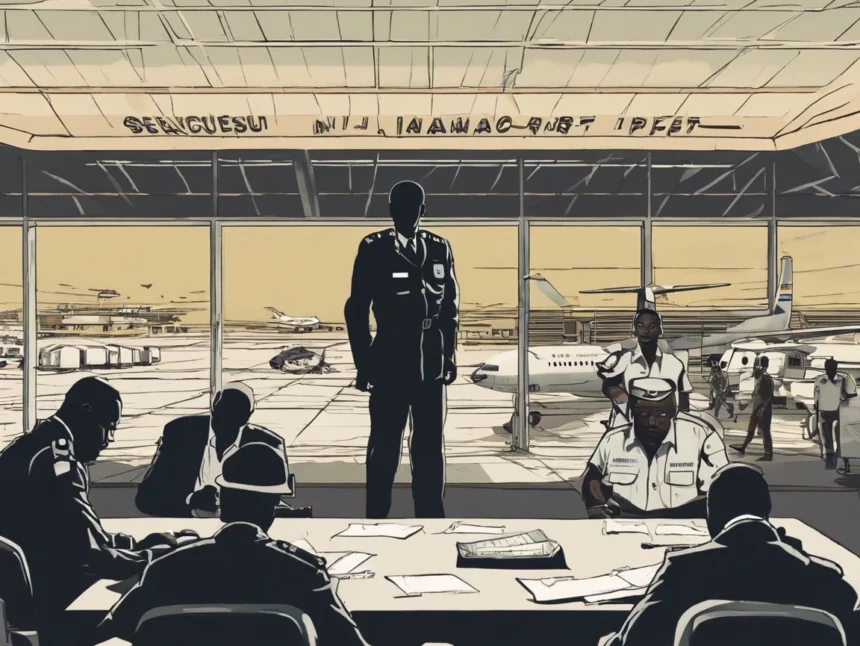The National Agency for Civil Aviation (ANAC) plays a pivotal role in the execution of the controversial Securiport contract, which has recently come under legal scrutiny due to accusations of corruption, embezzlement, and financial delinquency. While several high-ranking former ministers, including Major General Salif Traoré (Minister of Security and Civil Protection), Traoré Seynabou Diop (Minister of Equipment, Transport, and Disenclavement), and Dr. Boubou Cissé (Minister of Economy and Finance), have been questioned, the full extent of their involvement remains unclear. However, a deeper investigation into the contract reveals that the focus of the inquiry has thus far overlooked the significant role of ANAC in the financial management of the contract, raising questions about its responsibility in the matter.
The Securiport Contract and the Role of ANAC
Securiport LLC, a leading American aviation security firm based in Washington DC, is the principal contractor at Bamako-Sénou Airport in Mali. Securiport’s responsibility involves collecting access fees from passengers, which are included in the airline ticket prices. These fees are collected by ANAC, which is tasked with distributing the funds to the relevant parties according to the terms of the contract. Specifically, Securiport receives 75% of the collected funds, while the State is entitled to the remaining 25%. The question that has emerged is why the role of ANAC in the financial handling of the contract has not been more thoroughly examined, especially in light of revelations about missing pages from the contract, which suggest attempts to hide crucial financial details.
Missing Pages and the Implication of Corruption
A lawyer involved in the case recently revealed that a page detailing the State’s share of the profits from the Securiport contract had gone missing, raising concerns of possible deliberate concealment. While former ministers have been under investigation as co-signatories of the decree that implemented the contract, it is evident that ANAC’s role in collecting and distributing the funds has been central to the controversy. Despite the disappearance of key contract details, the original contract remains intact, implying that those responsible for the contract’s execution may have attempted to cover up the profit-sharing arrangement.
Legal Implications and the Role of the Attorney General
The case has raised significant legal concerns, with ongoing investigations into potential financial misconduct. The Attorney General of the Supreme Court has ruled on cases related to corruption and embezzlement, but the details of the Securiport case remain shrouded in ambiguity. As the legal process continues, there are lingering questions about whether ANAC’s management of the funds was fully transparent and whether the organization adhered to the terms set out in the Securiport contract. The absence of clarity on ANAC’s financial responsibilities further complicates the situation, leaving many to wonder whether some individuals may be escaping accountability.
Securiport’s Role in Aviation Security and the Revenue Model
Founded in Washington DC, Securiport LLC is recognized as a global leader in aviation security systems. Operating at Bamako-Sénou Airport, Securiport’s business model involves collecting fees from passengers for airport access, which are automatically included in the price of their airline tickets. These funds are then transferred to ANAC, which is responsible for ensuring that the correct percentages are allocated between Securiport and the State. With the mounting suspicions surrounding the financial handling of the contract, it is clear that the disbursement of collected funds plays a critical role in the investigation. The fact that these amounts are central to the legal case surrounding the Securiport contract underscores the scale of potential corruption and financial misconduct involved.
The Ongoing Investigation and Future Implications
As the legal case progresses, the focus remains on uncovering the full extent of the financial irregularities tied to the Securiport contract. ANAC’s role in distributing funds, alongside the missing contract details, suggests that the scope of the investigation may extend beyond the ministers and involve deeper scrutiny into the operational practices of ANAC itself. The involvement of Securiport, along with the missing contractual documents, makes this case one to watch closely, as it may lead to significant revelations about financial mismanagement, corruption, and the manipulation of public funds. As it stands, the ball remains in the Attorney General’s court, and only time will tell if full accountability will be achieved.







